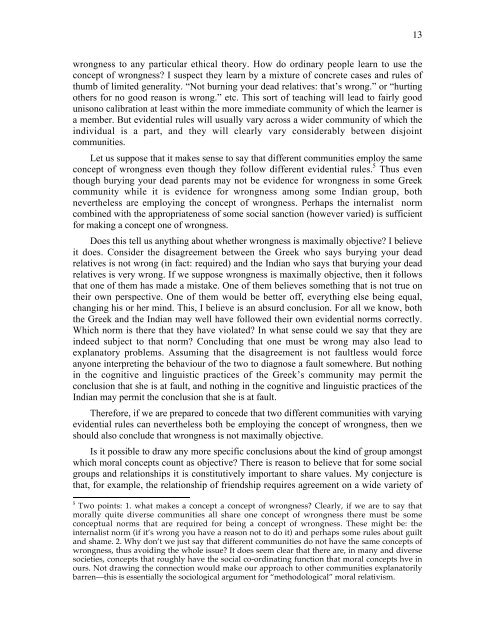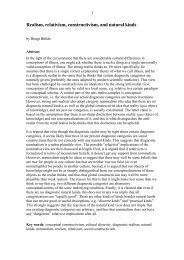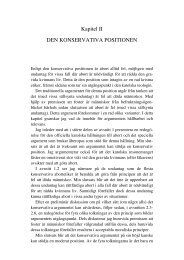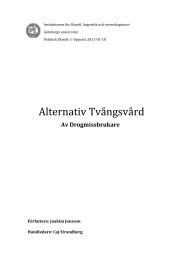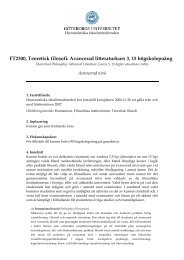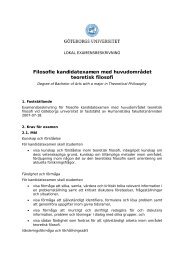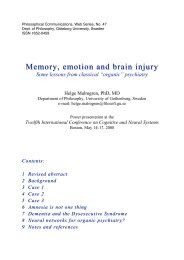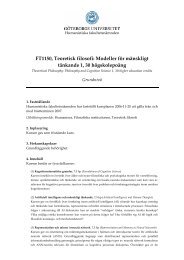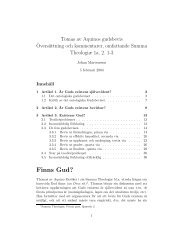Moral Relativism
Moral Relativism
Moral Relativism
- No tags were found...
Create successful ePaper yourself
Turn your PDF publications into a flip-book with our unique Google optimized e-Paper software.
13wrongness to any particular ethical theory. How do ordinary people learn to use theconcept of wrongness? I suspect they learn by a mixture of concrete cases and rules ofthumb of limited generality. “Not burning your dead relatives: that’s wrong.” or “hurtingothers for no good reason is wrong.” etc. This sort of teaching will lead to fairly goodunisono calibration at least within the more immediate community of which the learner isa member. But evidential rules will usually vary across a wider community of which theindividual is a part, and they will clearly vary considerably between disjointcommunities.Let us suppose that it makes sense to say that different communities employ the sameconcept of wrongness even though they follow different evidential rules. 5 Thus eventhough burying your dead parents may not be evidence for wrongness in some Greekcommunity while it is evidence for wrongness among some Indian group, bothnevertheless are employing the concept of wrongness. Perhaps the internalist normcombined with the appropriateness of some social sanction (however varied) is sufficientfor making a concept one of wrongness.Does this tell us anything about whether wrongness is maximally objective? I believeit does. Consider the disagreement between the Greek who says burying your deadrelatives is not wrong (in fact: required) and the Indian who says that burying your deadrelatives is very wrong. If we suppose wrongness is maximally objective, then it followsthat one of them has made a mistake. One of them believes something that is not true ontheir own perspective. One of them would be better off, everything else being equal,changing his or her mind. This, I believe is an absurd conclusion. For all we know, boththe Greek and the Indian may well have followed their own evidential norms correctly.Which norm is there that they have violated? In what sense could we say that they areindeed subject to that norm? Concluding that one must be wrong may also lead toexplanatory problems. Assuming that the disagreement is not faultless would forceanyone interpreting the behaviour of the two to diagnose a fault somewhere. But nothingin the cognitive and linguistic practices of the Greek’s community may permit theconclusion that she is at fault, and nothing in the cognitive and linguistic practices of theIndian may permit the conclusion that she is at fault.Therefore, if we are prepared to concede that two different communities with varyingevidential rules can nevertheless both be employing the concept of wrongness, then weshould also conclude that wrongness is not maximally objective.Is it possible to draw any more specific conclusions about the kind of group amongstwhich moral concepts count as objective? There is reason to believe that for some socialgroups and relationships it is constitutively important to share values. My conjecture isthat, for example, the relationship of friendship requires agreement on a wide variety of5 Two points: 1. what makes a concept a concept of wrongness? Clearly, if we are to say thatmorally quite diverse communities all share one concept of wrongness there must be someconceptual norms that are required for being a concept of wrongness. These might be: theinternalist norm (if it’s wrong you have a reason not to do it) and perhaps some rules about guiltand shame. 2. Why don’t we just say that different communities do not have the same concepts ofwrongness, thus avoiding the whole issue? It does seem clear that there are, in many and diversesocieties, concepts that roughly have the social co-ordinating function that moral concepts hve inours. Not drawing the connection would make our approach to other communities explanatorilybarren—this is essentially the sociological argument for “methodological” moral relativism.


